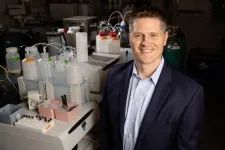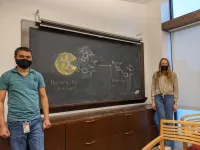Only 17 percent of free-flowing rivers are protected, new research shows
New research published in special issue co-edited by NAU researcher finds that biodiversity commitments will be key to freshwater protection
2021-05-12
(Press-News.org) New science about the fate of freshwater ecosystems released today by the journal Sustainability finds that only 17 percent of rivers globally are both free-flowing and within protected areas, leaving many of these highly-threatened systems¬--and the species that rely on them --at risk.
"Populations of freshwater species have already declined by 84 percent on average since 1970, with degradation of rivers a leading cause of this decline. As a critical food source for hundreds of millions of people, we need to reverse this trend," said Ian Harrison, freshwater specialist at Conservation International, adjunct professor at Northern Arizona University and co-editor of the journal issue.
As the world looks to establish new conservation targets at the UN Convention on Biological Diversity meeting later this year, scientists are calling on policymakers to prioritize increasing protection of freshwater ecosystems and species and to better integrate land and water conservation.
Free-flowing rivers and other naturally functioning freshwater ecosystems sustain biodiversity and the food supply chain, drinking water, economies and cultures for billions of people worldwide. Therefore, their protection is critical to sustain these values," said Jonathan Higgins, senior freshwater science advisor at The Nature Conservancy
A newly formed coalition of water resource experts--including representatives from academia as well as the World Wildlife Fund (WWF), Conservation International and The Nature Conservancy, among other entities-- coordinated this first-of-its-kind collection of papers focused exclusively on durable protections for free-flowing rivers, with the aim of offering a blueprint to policymakers so they can integrate the best available science into environmental action plans. There is no global framework focused specifically on river protection, and freshwater protection receives less attention and funding than comparable efforts for marine and terrestrial systems.
The collection of 15 studies with authors from throughout the world offers examples of free-flowing river protections through the application of scientific research, law, policy and on-the-ground implementation of restoration and management strategies.
It is co-edited by Denielle Perry, a water resource geographer who leads the Free-flowing Rivers Lab in the School of Earth and Sustainability at NAU, and Harrison, who also is co-chair of the Freshwater Conservation Committee of IUCN's Species Survival Commission. Both are founding members of the Durable River Protection Coalition, which is working to enable scientific research and policy proposals to help local communities, national governments, international institutions and private and public investors better protect these valuable but vulnerable resources.
"These ecosystems are among the most understudied and under-protected in the world, and they are at risk from further severe alteration and degradation by a range of threats, including poorly sited dam construction, overfishing, excessive water extraction and pollution," Perry said. "This first-of-its-kind collection addresses growing calls to protect rivers as corridors in a changing climate and for the important role they play in providing ecosystem services and livelihoods around the world. We are at a moment when climate change and policy will shape the path of development, and the management of our riverine resources. We must act to protect rivers now because failing to do so will have lasting consequences for decades to come."
The article topics range from global assessments to local case studies, including discussion of a framework that defines durable river protection, safeguarding free-flowing rivers through various policy mechanisms, adaptive management of the Malkumba-Coongie Lakes Ramsar site in Australia, the biological and cultural importance of sustainable floodplains in North Africa and more. The issue also features rivers in India, Mongolia, Mexico, China and the United States. Several articles take an in-depth look at a specific freshwater ecosystems and offer insights that can be applied elsewhere.
"The recommendations made in this special issue for more forward-thinking protections and wise use of our inland aquatic resources are timely. Wetlands are a powerful nature-based solution to the many challenges the world is facing. Taking action now for wetlands is foundational for creating the future we want," said Martha Rojas Urrego, Secretary General of the Ramsar Convention on Wetlands.
As policymakers gather virtually this month to develop new global conservation goals, experts are calling for improved global targets for river protection. There is clear scientific evidence for the value of free-flowing rivers, including their ability to sustain migratory fish and to deliver the sediment needed to maintain river deltas--home to 500 million people and some of the most productive agricultural land on the planet--and prevent them from sinking and shrinking. Due to these values, researchers are calling for increased protections for free-flowing rivers as part of river basin management strategies.
"While 17 percent of all free-flowing rivers are within protected areas, in most countries the level of protection for large rivers is far lower," said Jeff Opperman, WWF's global lead freshwater scientist. "It's these large rivers that are most crucial for supporting fisheries that support rural communities."
INFORMATION:
Durable River Protection Coalition members include:
Academic
El Colegio de la Frontera Sur
National Autonomous University of Honduras
Northern Arizona University
Saint Louis University/National Great Rivers Research and Education Center
University of Mpumalanga
University of Nevada, Reno
University of New South Wales
Yunnan University
NGOs
Alliance for Freshwater Life
American Rivers
Conservation International
Earth Law Center
International Rivers
IUCN WCPA Freshwater Specialist Group
Musconetcong Watershed Assoc
Pisgah Map Company, River Management Society, American Whitewater
The Nature Conservancy
Trout Unlimited
WWF
Law firm
Milaré Advogados - Environmental Consultancy
Intergovernmental organization
ICIMOD
ELSE PRESS RELEASES FROM THIS DATE:
2021-05-12
By Karina Ninni | Agência FAPESP – A study of 92 adolescents conducted in Brazil suggests girls are more likely than boys to develop metabolic alterations associated with obesity, such as high blood pressure and excessive blood levels of cholesterol and triglycerides (dyslipidemia).
The study was conducted with FAPESP’s support by scientists affiliated with the University of São Paulo’s Biomedical Sciences Institute (ICB-USP) and the Medical School of Santa Casa de Misericórdia de São Paulo (FCM-SCMSP). The findings are reported in an article in the journal Frontiers in Nutrition.
According to the authors, the obese girls displayed a pattern of lipid profile alterations not seen in girls without obesity and a higher propensity to ...
2021-05-12
Asian students and faculty have long been a cornerstone of science in the U.S., drawn by the promise of collaboration and cutting-edge research. However, the Asian community is facing increased racist attacks and scrutiny from the government. A cover story in Chemical & Engineering News, the weekly newsmagazine of the American Chemical Society, explores how Asian scientists are reassessing their futures in the U.S.
In the wake of the COVID-19 pandemic, racist attacks against the Asian community in the U.S. have increased notably, with nearly 4,000 incidents reported between March 2020 and February 2021. Some attribute this to former President Donald Trump's rhetoric about the pandemic originating in China, writes Senior Editor Andrea Widener. ...
2021-05-12
TAMPA, Fla. -- Melanocytic nevi, or moles, are nonmalignant growths that arise from pigment producing cells of the skin. They are mostly found in sun-exposed areas; however, they also can be found in sun-protected areas, such as the palms, soles of feet and nail beds, where they are known as acral nevi. While the mutation profile of nevi in sun-exposed areas is well understood, less is known about the genes that are commonly mutated in acral nevi. And while a subset of melanoma of sun-exposed skin arises in nevi, the link between nevi and melanoma in acral skin is poorly understood. In ...
2021-05-12
NEW YORK, NY--While there was extensive use of drug repurposing throughout the first 10 months of the COVID-19 pandemic, there was substantial heterogeneity over the types of drugs used for treatment purposes globally. Some drugs, including hydroxychloroquine, saw sharp declines in use, while adjunctive therapies grew into a more relied upon method for patient management.
In a number of cases, scientific discovery overturned misconceptions proclaimed via press conferences and social media.
The OHDSI network study "Use of repurposed and adjuvant drugs in hospital patients with covid-19: multinational network cohort study," published May 11 by The BMJ, provides a global view ...
2021-05-12
URBANA, Ill. - Gut health is having a moment, with sales of fermented foods such as kefir, kombucha, and kimchi steadily on the rise. The benefits of "good bacteria" in fermented foods and supplements go well beyond the gut, moderating immune responses, heart health, weight, and even mood. But do products hold up to the claims on their labels?
A new study from the University of Illinois and The Ohio State University examined bacterial content of five brands of kefir, a fermented dairy beverage often likened to drinkable yogurt. The research showed the majority of products overstated bacterial density and contained species not included on the label.
"Our ...
2021-05-12
The ability to connect and feel a sense of belonging are basic human needs but new Swansea University research has examined how these are determined by more than just our personal relationships.
Research led by psychologist Professor Andrew Kemp, of the College of Human and Health Sciences, highlights the importance of taking a wider approach to wellbeing and how it can be influenced by issues such as inequality and anthropogenic climate change.
Professor Kemp worked with PhD student Jess Mead and consultant clinical psychologist Dr Zoe Fisher, of the University's Health and Wellbeing Academy, on the study which presents a transdisciplinary ...
2021-05-12
CHAMPAIGN, Ill. -- Young people with diverse gender identities may be bullied and victimized up to three times more often than peers who identify as male or female, a new study of more than 4,464 adolescents in Illinois found.
The students were part of a statewide survey of eighth- through 12th-grade youths in Illinois schools.
"Transgender youths reported the highest rates of all forms of peer victimization, which were double to nearly triple those of males and up to 2.6 times higher than those of females," said social work professor Rachel Garthe of the University of Illinois Urbana-Champaign, who led the research.
"Slightly ...
2021-05-12
Can a protein found in a mosquito lead to a better understanding of the workings of our own brains? Prof. Ofer Yizhar and his team in the Weizmann Institute of Science's Neurobiology Department took a light-sensitive protein derived from mosquitos and used it to devise an improved method for investigating the messages that are passed from neuron to neuron in the brains of mice. This method, reported today in Neuron, could potentially help scientists solve age-old cerebral mysteries that could pave the way for new and improved therapies to treat neurological and psychiatric conditions.
Yizhar and his lab team develop so-called optogenetic methods - research techniques that allow them to "reverse engineer" the activity of specific brain circuits ...
2021-05-12
EAST LANSING, Mich. - As climate change threatens global food security, researchers at Michigan State University are building better beans crucial to human nutrition by tapping into the genetics of the more heat-resistant tepary bean.
The tepary bean (Phaseolus acutifolius A. Gray) is a sister of the common bean which includes kidney, pinto and navy beans. "The common bean is the number one source of protein and nutrients for many people living in Central America and Africa," said Robin Buell, a professor of plant biology in MSU's College of Natural Science and former director of the Plant Resilience Institute.
Her research on bean genetics was published May 11 in Nature Communications.
"Mother nature has already made plants that are adapted to different climates," ...
2021-05-12
Molecules are the building blocks for our modern world, from phones to cars to Doritos. But coming up with new ones is still an incredibly costly and time-consuming process. A group of University of Chicago chemists wants to find a better way.
"If you look at a diagram of a molecule, it seems like you should be able to just snap them together like Tinkertoys, but you can't," said Asst. Prof. Mark Levin. "We'd like to change that."
Their new discovery, published May 12 in Nature, represents a first step towards that transformation: a way to easily cut nitrogen atoms from molecules.
Despite decades of experiments, chemistry remains an art in many ways because molecules are built in a long, iterative process: attaching ...
LAST 30 PRESS RELEASES:
[Press-News.org] Only 17 percent of free-flowing rivers are protected, new research shows
New research published in special issue co-edited by NAU researcher finds that biodiversity commitments will be key to freshwater protection



